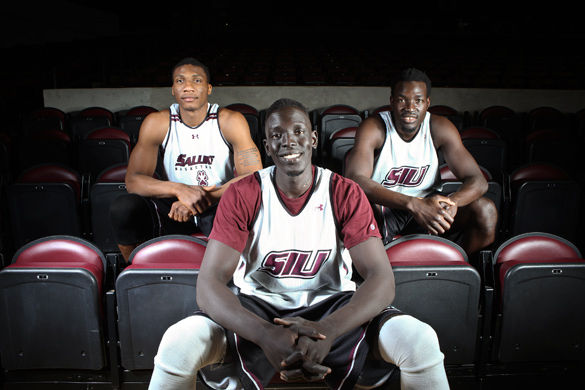Africa ‘central’ to Saluki men’s basketball
February 22, 2015
If southern Illinois is known as Little Egypt, SIU’s men’s basketball team should be known as “tall Africa,” as all three centers were born there.
The three took similar paths to Carbondale, learning the game as teenagers and leaving their families to live with strangers across the Atlantic Ocean.
Junior Ibby Djimde, sophomore Bola Olaniyan and junior Deng Leek are good friends off the court. They joked around during a photo shoot, teasing one another about being too ugly and ruining the picture. Djimde said their friendship comes from their understanding of each other.
Advertisement
“When I speak, Bola and Deng know what I am saying,” Djimde said. “And we know how each other feel because we are in the same situation.”
The three Saluki centers often hang out together after practice, talking about soccer and what they miss about the food and weather of their home continent. All of them said they miss Africa’s traditional food and their families the most.
Leek said Black History month is a new idea for someone who grew up in Africa.
“I didn’t know about races until I came to the states,” Leek said. “Because over there, you’re always with different people, so you don’t worry about races and stuff.”
{{tncms-asset app=”editorial” id=”7470fb5c-bb12-11e4-bd0a-2fc45d0f0e25″}}
Ibby Djimde
Djimde was born in Mali, where he lived until he was 17. He and his family lived in the capital city of Bamako and did not have electricity until a few years before he came to the United States.
Advertisement*
He grew up playing soccer, but when he was a freshman in high school, a teacher—noting how tall he was—convinced him to try basketball.
Djimde, who came to America by himself in 2009 to live with a host family, attended Huntington Prep School in Huntington, W.Va.
He said the biggest difference between basketball in Africa and the United States was the rule variations at different levels in America.
Forty-nine languages are spoken in Mali, none of which are English, requiring him to work on breaking down language barriers.
“The first thing was the language,” Djimde said. “When I come here, I didn’t speak any English, so learning English was the hard part.”
Djimde speaks French, the official language of Mali, Bambara and two other Malian languages in addition to English.
The most notable social difference between the United States and Mali was the level of personal interaction, Djimde said.
“In my country, everybody knows everybody,” Djimde said. “But here, no. You don’t socialize as much.”
He started his collegiate career at the University of Illinois where he was recruited by former Saluki coach Bruce Weber. Djimde transferred to SIU after Weber was fired.
Bola Olaniyan
Olaniyan grew up in Lagos, Nigeria. Unlike Djimde, Olaniyan had electricity in his home, but said he notices how much more prevalent electricity is in America.
Like Djimde, he started out playing soccer, but took up basketball at 16 because of his height.
He came to the United States to play at Mount Zion Christian Academy in Durham, N.C. his junior year. He spent his senior year playing at Richmond High School in Richmond, Ind.
Olaniyan also faced a language barrier upon his arrival in the states.
“Back home, we speak a little bit of English, but it’s not like American English,” Olaniyan said. “When I came to America, I couldn’t understand what they were saying, and they didn’t understand me.”
Although he only played basketball for one year in Nigeria, Olaniyan said the American game is much faster.
Deng Leek
Leek was born in Sudan, the third youngest of 21 children. Leek said the experience of having so many siblings shaped who he is today.
“Back home, respect is the main thing, Leek said. “I had to make sure I listened to my older sisters. … It’s helped me a lot through my life.”
Like Djimde and Olaniyan, soccer was his first sport, but his father encouraged him to learn basketball.
“My dad was always telling me, ‘You’re supposed to play basketball,’ because he saw a future ahead of me,” Leek said. “But I didn’t see that.”
Leek started to buy in when he was 6 feet 3 inches tall in seventh grade. His brother, Deng, who played basketball for Norfolk State, helped him get scholarships to come to America.
“After that, I fell in love with it,” Leek said.
His older brother, Leek, played for Campbell University from 2012 to 2014.
SIU’s Leek played high school basketball at Wesleyan Christian Academy in High Point, N.C. He played at Jacksonville College in Jacksonville, Texas before transferring to SIU before this year.
Deng speaks three languages: Arabic, English, which are the official languages of Sudan, and Dinka, which is spoken in southern Sudan.
Leek said he misses the longer summers of Sudan. The sub-freezing weather of the Midwestern United States has been a change for him.
“The summers are about seven months long,” Leek said. “It’s nice. Actually, a month ago, my sister sent me a picture of snow back home, which never happened before. It usually only snows on the mountains, but it never reached the ground. I never thought it would snow there”
Thomas Donley can be reached at [email protected] or at 536-3311 ext. 269.
Advertisement









